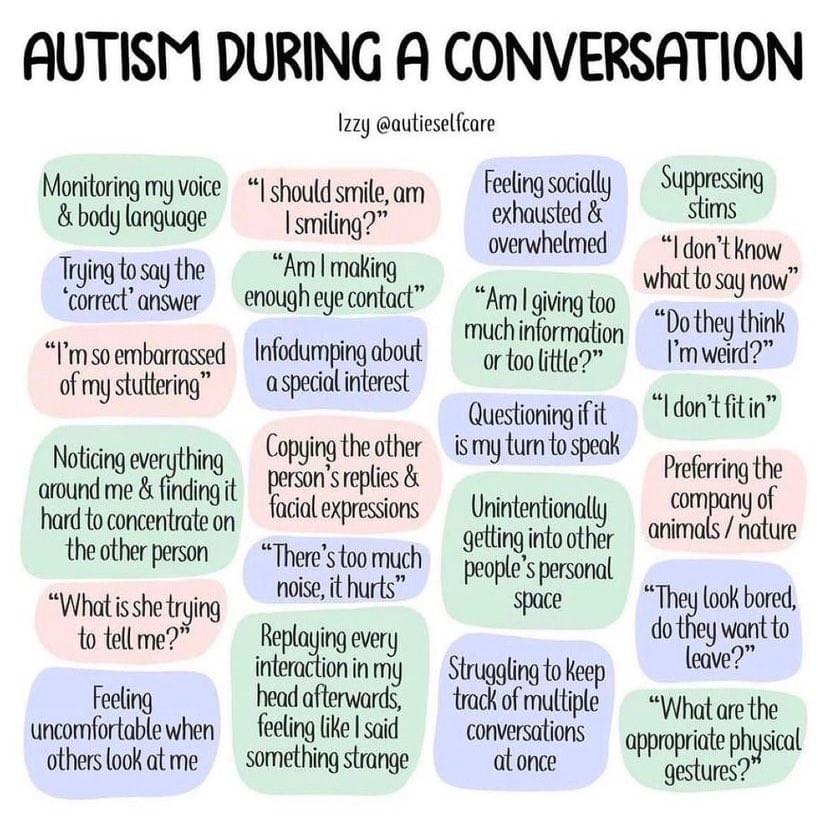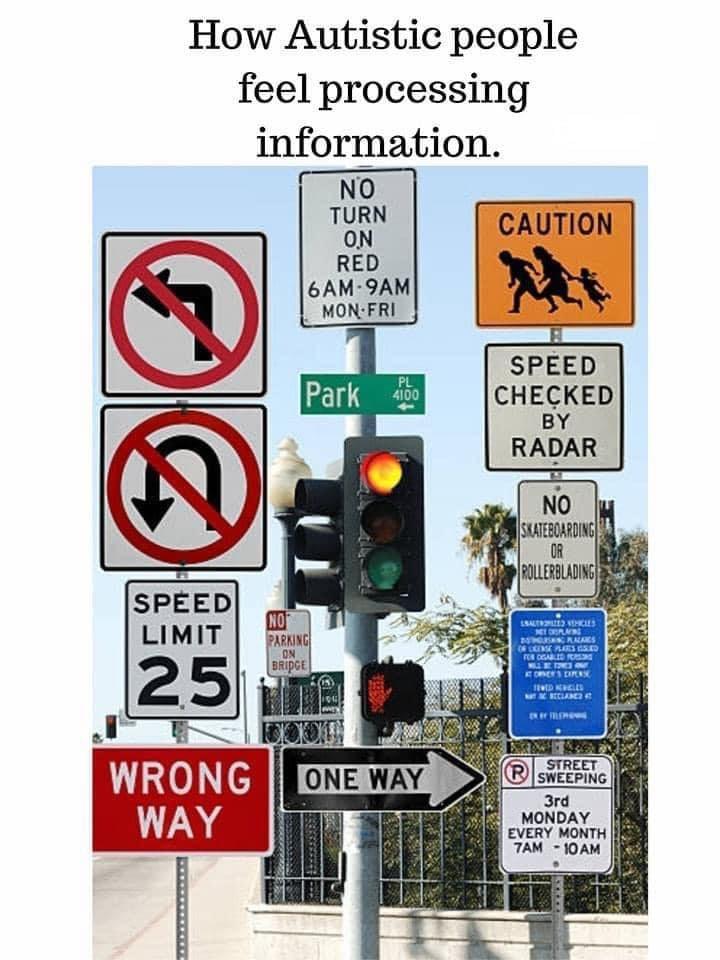

AUTISM DURING A CONVERSATION
Conversation can be difficult for autistic people. Social encounter as such can be difficult for autistic people. Lacking internal filters and editors screening out the irrelevant, autistic people are dealing with a massive information flow in conversation; they are having to do consciously and mechanically what to other people comes internally. That means that the intellect is doing the job of the instincts, which is high energy and high maintenance - and exhausting.
A picture paints a thousand words.
This image expresses how autistic people feel when processing information in social encounter.

Autistic people can be construed as blunt, even rude, in conversation, tending to 'tell it like it is,' that is, as information presents itself to the senses, in all its immediacy. They will see things clearly and 'state the obvious.' This can cause problems in encounter, because the social world comprises people and not just 'things.' If autistic people can see through the social subterfuge, they can also fail to see that it is social niceties that ensure social connection, however ephemeral, shallow, and even false they may seem (and actually be).
The lack of internal filters and editors means that the whole world is immediately present to the senses of the autistic person; that means that autistic people have to consciously impose a signalling system like the one presented in the mean above.
The autistic tendency to see things clearly and cut to the heart of the matter beyond the social surface also makes social encounter difficult. You soon learn that your presence can make others wary, fearing what you may say. Even long after you have learned to varnish your words, tempering them down to a level people can cope with, that wariness on the part of others remains (at least with people who know, or know of, you).
And my point is this: the people who are wary of autistic people in conversation don't know how easy they have it. Conversation, like pretty much every social encounter, requires an inordinate amount of thought, effort, and energy on the part of the autistic person, none of which is seen by others. And all the time, the autistic person knows that the slightest infraction of the social rules on their part will be penalised heavily by those who need made little effort in social engagement. It takes a huge amount of energy to restrain one's natural inclination to 'tell it like it is.' However accurate your assessments and judgements, you learn that the last thing people need to hear is 'the truth.' Always, you know much more than you are letting on, and deep down those you engage in social encounter know it - hence the wariness. Sadly, in my experience, you can internalize all the rules, make all the accommodations, learn how to play by the rules and so on, and still find others ready to be judgemental and censorious should you deviate in the slightest from their model of perfect social mediocrity. Such people have no idea of the efforts you make in social engagement, and have no interest.
There are a number of key lessons for autistic people here:
1) Learn and respect the social rules as best you can, without diminishing or denying your authentic self. Find the happy medium between being your authentic self and a social being able to engage with others.
2) Avoid trying being all things to all people, that only works by being the perfect nothing, cancelling yourself out.
3) Avoid people who would control, censor, and compel speech. Such people will have you masking and performing a role, things which are the common blight of autistic people. People who draw the line at the free expression of your authentic self do not have your best interests at heart, only their own.
4) Never ever fit yourself to others' opinions, demands, and expectations.
5) Be careful in your relations to others. If human beings as social beings need others in order to be themselves, then you, as a particular being, do not need all others, only some others. In being your own particular self, be particular with whom you admit into your life.
I shall briefly go through the points in the main meme:
1) Monitoring voice and body language - this is constant and ongoing during a conversation. As you converse with another or with others, you are also conversing with yourself, constantly worrying that you are saying or doing something amiss, constantly checking back with your conscious mind that you are doing it right. That's exhausting. Take it as read that every point here is exhausting;
2) I should smile, am I smiling - performing, in other words. You are aware you are playing a role. Rather than being natural, you are constantly wandering if you are doing it right and that your responses are appropriate. Personally, I'd rather not perform and would prefer the company of people who actually welcome and value my own authentic and unique self - should truth come to be tolerated, as Bertrand Russell once put it;

